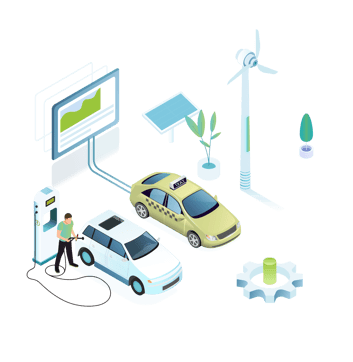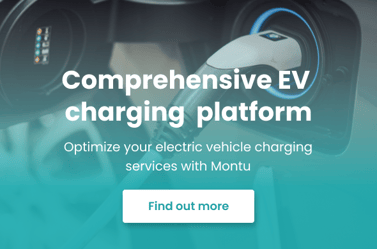Empower your fleet's efficiency with EV charging solutions

- E-MOBILITY
- MONTU
- ELECTRIC VEHICLES
- ELECTRIC CHARGING STATION
- ELECTRIC CHARGING
As businesses increasingly embrace sustainable practices, electric vehicles (EVs) have emerged as a game-changer for fleet management. With their environmental benefits and increasing availability, EVs are becoming attractive for businesses seeking to optimize their operations while reducing their carbon footprint. However, to fully optimize the efficiency of an EV fleet, it is essential to establish a robust electric charging infrastructure.

Electric charging infrastructure in Europe has experienced significant growth and development, fostering the widespread adoption of EVs across the continent. European countries have implemented comprehensive charging station networks, including fast-charging options, to accommodate the increasing demand for EVs. According to the European Alternative Fuels Observatory, as of April 2023, over 500,000 public recharging points are available for EV motorists across its 27 member states in the European Union. These include both regular charging stations (AC) and fast charging stations (DC):
- AC Charging Points: 455,902
- DC Charging Points: 56,437
The number of charging stations is continuously increasing to meet the growing demand for electric vehicle charging; therefore, it is no question that businesses will open to fleet EV services at a higher pace. Also, the European Union has been actively promoting the expansion of charging infrastructure through various initiatives and funding programs.
| |
What is an EV fleet?An EV fleet refers to a group of electric vehicles owned/leased, operated, and managed by a particular organization, business entity or governmental agency. Familiar examples include taxis, city vehicles, freight trucks, corporate transportation, delivery services, ridesharing, and other fleet-based operations. |
|
EV fleets are gaining popularity as businesses and organizations seek to transition from traditional internal combustion engine (ICE) vehicles to more sustainable and environmentally friendly transportation options. By adopting electric vehicles in their fleet, companies can reduce their carbon footprint, decrease operating costs, and contribute to a cleaner and greener future.
| |
|
|
EVs are powered by electricity, generally cheaper than gasoline or diesel fuel. The cost per mile/kilometre of EV driving is typically lower than an equivalent ICE vehicle. It leads to direct cost savings in fuel expenses for EV fleet operators. EVs also have lower operating costs compared to traditional internal combustion engine vehicles. Additionally, EVs have fewer moving parts and require less maintenance, leading to lower maintenance and repair costs over the vehicle's lifespan.
EV fleets are more energy-efficient than internal combustion engines. This increased efficiency translates into reduced energy consumption and overall improved energy efficiency, making electric vehicles an environmentally-friendly choice for transportation. Vehicle-to-Grid (V2G) technology offers a transformative opportunity for EV fleets, as with V2G capabilities, EVs can discharge stored energy back to the grid during peak demand periods, becoming a valuable resource for grid stabilization. This technology opens up new revenue streams for fleet operators, enhances the value of EVs, and supports the transition to a more innovative and more efficient electrical grid.
To encourage the adoption of electric vehicles (EVs), governments worldwide provide tax incentives, subsidies, and grants. These financial benefits help reduce the upfront costs associated with purchasing or leasing EVs, making them more economically viable for fleet operators. The availability of such incentives can significantly enhance the financial attractiveness of transitioning to an EV fleet, enabling businesses to save money while contributing to a sustainable future. Taking advantage of these incentives supports fleet operators and aligns with government goals to reduce emissions and promote clean transportation.

Another notable advantage of EVs is their quieter operation. Unlike traditional vehicles with internal combustion engines, EVs produce significantly less noise. This reduction in noise levels has positive implications, especially in urban areas where noise pollution is a concern. The decreased noise creates a more peaceful and pleasant environment for drivers, passengers, and residents. It can enhance the quality of life, improve overall well-being, and promote more sustainable and harmonious coexistence between transportation and urban communities.
Several cities and regions have established low-emission zones restricting or charging higher fees for high-emission vehicles. An EV fleet allows businesses to access these zones without additional costs or restrictions, ensuring uninterrupted operations in urban areas.
As the transition to clean energy and sustainable practices accelerates, companies that proactively adopt EV fleets gain a competitive advantage. EV fleets show a stronger brand image as these businesses promote sustainability and zero-emission approaches. They stand out in the market as leaders in sustainability, setting themselves apart from competitors who have yet to make the switch. This differentiation can attract environmentally conscious customers and stakeholders, further strengthening the brand's image and market position.
It's important to mention that managing an EV fleet involves various considerations, including establishing an adequate charging infrastructure, implementing energy management software, optimizing charging schedules, and providing driver training on efficient charging practices and maximizing range. Grape Solutions' Montu software is a comprehensive platform for managing fleet electric vehicles with its desktop management view for operators and a mobile application for motorists. For more information, click here.
Share this post on social media:
Posts by Tag
- IoT (17)
- Smart cities (16)
- E-mobility (14)
- Energy Management (10)
- Mobility (9)
- Software development (9)
- Marketing automation (6)
- RPA (6)
- Robotic Process Automation (6)
- electric vehicles (6)
- Internet of Things (5)
- IoT solution (5)
- Marketing software (5)
- Smart Building (5)
- Business Intelligence (4)
- Custom applications (4)
- IoT platform (4)
- Uipath (4)
- electric charging (4)
- IoT devices (3)
- Properties (3)
- AI (2)
- BI (2)
- Montu (2)
- Multi-device functionality (2)
- Omnichannel (2)
- RPA Budapest (2)
- Smart city (2)
- UX design (2)
- app development (2)
- artificial intelligence (2)
- crm (2)
- crm software (2)
- electric charging station (2)
- machine learning (2)
- marketing campaign (2)
- optima (2)
- API Testing (1)
- Agriculture (1)
- Automated Testing (1)
- BYOD (1)
- EV (1)
- Energy Communities (1)
- Event insights (1)
- Event report (1)
- Green IoT (1)
- HR (1)
- IT Outsourcing (1)
- ML (1)
- Power BI (1)
- Resource Management (1)
- Smart Home (1)
- Smart Office (1)
- TaaS (1)
- UX/UI Design (1)
- Xamarin (1)
- cloud (1)
- cloud computing (1)
- cross-selling (1)
- data driven marketing (1)
- digital twin (1)
- dynamic customer segmentation (1)
- esg (1)
- inbound marketing (1)
- industry 4.0 (1)
- onprem (1)
- onpremise (1)
- scalability (1)
- software robot (1)
- testing as a service (1)
- upselling (1)
Recent Posts
Read On

- SMART BUILDING
- ENERGY MANAGEMENT
- PROPERTIES
Energy management software for properties and buildings
Buildings encounter multiple challenges in today's fast-paced world, necessitating cost-effective and creative solutions. With expanding urbanization, increasing energy demand and environmental concerns, buildings must evolve to meet changing requirements while minimizing their resource consumption...

- SMART BUILDING
- ENERGY MANAGEMENT
- PROPERTIES
Green building tech trends that are shaping the construction industry
The construction industry plays a significant role in environmental degradation, meaning that sustainability and green solutions are fundamental in improving our lives' environmental, economic, and societal aspects. Green buildings present an alternative method to reduce the environmental impact of...

- IOT
- E-MOBILITY
- ENERGY MANAGEMENT
- SMART CITIES
4 ways software solutions can help companies' decarbonization strategies
Decarbonization, the process of reducing or eliminating harmful emissions, has emerged as a central focus in our collective efforts to combat climate change and pave the way for a more sustainable and environmentally friendly future. Software solutions play a crucial role in supporting companies'...



